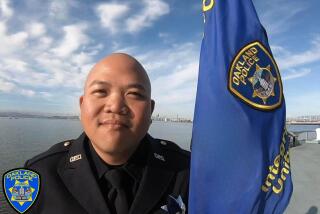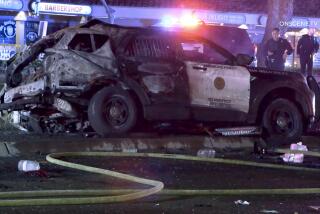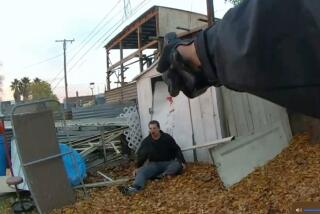San Diego officer won’t be charged in shooting death of Afghan man

Dist. Atty. Bonnie Dumanis, pictured in 2012, said officers and civilians were interviewed about the shooting.
The San Diego district attorney Monday declined to file charges against a San Diego police officer involved in a fatal shooting that led the police chief to tighten rules about officers wearing body cameras.
Dist. Atty. Bonnie Dumanis made the announcement after what she called an exhaustive investigation that began the night of the shooting and involved interviews with officers at the scene and civilians who were close by.
Officer Neal B. Browder, a 27-year veteran of the department, had not switched on his body camera when he shot and killed 42-year-old Fridoon Zalberg Rawshannehad, an Afghan immigrant.
Browder had reason to fear for his life and that of civilians when he confronted Rawshannehad, who had a history of mental illness and drug use, shortly after midnight on April 30 in an alley behind an adult bookstore in the city’s Midway neighborhood, Dumanis said.
Browder had responded to a call that a man with a knife was threatening people inside and outside the bookstore.
Browder confronted Rawshannehad in the alley and gave him “verbal commands ... but he continued to advance on the officer,” according to Lt. Mike Hastings.
Browder fired at least once. A knife sheath and a metallic object, but no knife, were found near the body. The metallic object proved to be a pen.
Dumanis quoted Browder telling investigators, “I swear I thought he was going to stab me.” He estimated that Rawshannehad was 10 to 15 feet away from him; a recreation of the scene put the distance at approximately 17 feet, Dumanis said.
The incident was the first time that Browder had fired his weapon in the line of duty, Dumanis said.
The incident fits a common pattern, Dumanis said, of an officer responding to a call of a mentally ill person acting in a menacing way toward others and forced to make an instant decision on whether to use force.
The incident was recorded on a surveillance camera outside the store. But Browder had not switched on his body camera.
The American Civil Liberties Union was immediately critical of Browder’s failure to turn on his camera and also of the Police Department’s refusal to release the tape from the surveillance camera.
Two weeks after the shooting, Chief Shelley Zimmerman announced that she had revised the body camera policy so that “officers will now be trained to start recording prior to their arrival on radio calls that are likely to result in an enforcement contact.”
Department policy previously required officers to turn on the small cameras when an enforcement action was imminent.
Minutes after Dumanis’ decision was announced Zimmerman issued a statement that, “The tragic circumstances surrounding this case highlight the need for us to continue to collaborate on solutions towards the mental health crisis facing our nation and our city.”
Rawshannehad’s family filed a wrongful-death lawsuit against the Police Department, asserting that the private surveillance camera shows that he was further away than the officer asserted.
The city went to court to ask the judge to keep the surveillance tape under wraps until the lawsuit is finished. The judge agreed, to the dismay of the ACLU and news organizations.
“The department has said it is deploying body cameras in part to build community trust,” said Margaret Dooley-Sammuli, criminal justice and drug policy director for the ACLU of California. “Releasing the surveillance video would show the community the department is committed to that promise.”
Zimmerman and Mayor Kevin Faulconer are supporters of the use of body cameras by police officers and have taken pride in the fact that the San Diego department is among the largest in the nation to require them.
According to documents filed with the city as part of a family claim, Rawshannehad suffered with post-traumatic stress disorder and was diagnosed with schizophrenia and bipolar disorder.
He came to the U.S. in 2003 after being in the Afghan army and captured by insurgents, the claim said.
At a news conference, Dumanis said Rawshannehad had a long history of mental illness and being violent with his mother and sister.
Twitter: @LATsandiego
ALSO
‘Shrimp Boy’ Chow federal trial begins in Bay Area
Secret military exercises change approach for some LAX flights
Chilly storm could bring showers to L.A.; Northern California hit by snow and lightning
More to Read
Sign up for Essential California
The most important California stories and recommendations in your inbox every morning.
You may occasionally receive promotional content from the Los Angeles Times.










